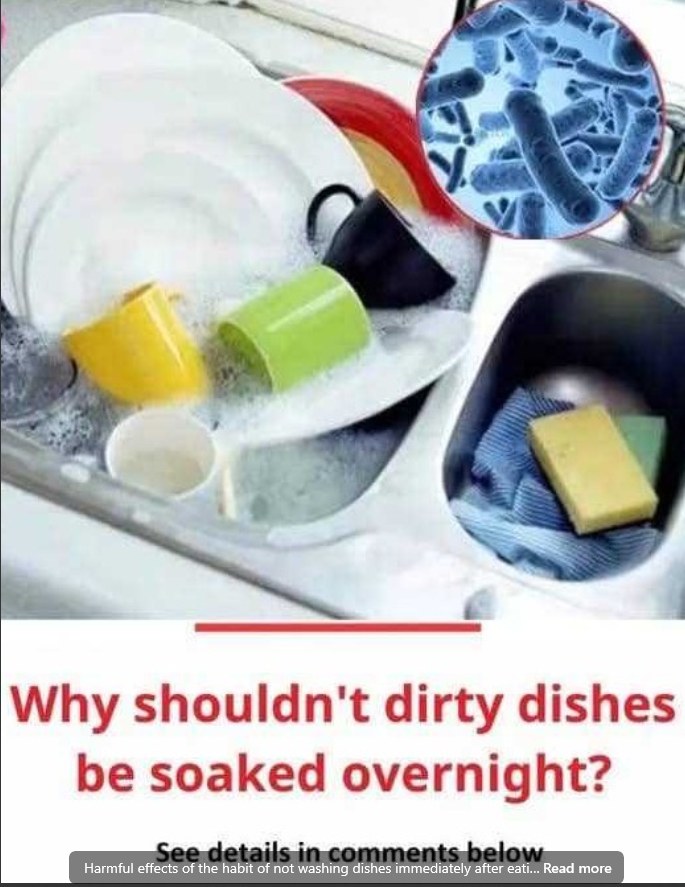ADVERTISEMENT
While the immediate consequence of leaving dishes for later might appear trivial, the cumulative effects of regularly deferring this task can be more harmful than we realize. From attracting pests and creating a breeding ground for bacteria to negatively impacting your mood and time management, the practice of leaving dishes undone can have serious repercussions. In this article, we’ll delve into the harmful effects of not washing dishes immediately after eating and provide insights into why this seemingly small habit can snowball into larger problems.
—
### **1. Bacteria and Germ Growth: A Silent Threat**
One of the most immediate and harmful effects of leaving dirty dishes out for an extended period is the accumulation of bacteria and germs. When food is left on dishes for hours or even overnight, it creates an environment where bacteria can thrive. Moisture from leftover food, combined with warmth, especially in the kitchen, forms the perfect breeding ground for harmful microorganisms.
#### **The Growth of Bacteria**
Foods, particularly those high in protein (meats, dairy, eggs), sugars, and starches (bread, pasta), are especially attractive to bacteria. These foods offer essential nutrients for bacteria to grow and multiply. Bacteria such as *Salmonella*, *E. coli*, *Listeria*, and *Campylobacter* thrive in environments where food is left exposed at room temperature.
According to the U.S. Food and Drug Administration (FDA), perishable foods should not be left out for more than two hours at room temperature. Beyond this period, bacteria can double in number every 20 minutes, increasing the likelihood of contamination. While it might seem harmless to leave dishes for a few hours after eating, over time, this practice can contribute to higher risks of foodborne illnesses, especially when dishes aren’t washed immediately after use.
#### **Mold and Fungal Growth**
The food remnants left on dishes not only invite bacteria but also fungi. Mold can grow on food particles that are left behind, especially on starchy foods, sugary items, or damp environments like glasses and bowls. Mold spores can easily spread into the air and even contaminate other kitchen surfaces, furthering the cycle of contamination.
Mold exposure can lead to health issues such as respiratory problems, allergic reactions, and sinus infections. In severe cases, it may even cause more significant issues in individuals with weakened immune systems or those prone to asthma.
—
### **2. Attraction of Pests and Insects**
If you’ve ever come into your kitchen to find fruit flies buzzing around or ants marching across your counter, you know how easily pests can be attracted by leftover food on dirty dishes. Pests like cockroaches, ants, flies, and rodents are not just a nuisance—they also present serious health risks.
#### **Fruit Flies and Gnats**
Fruit flies are particularly drawn to the sugars and organic matter left on plates and glasses. These tiny pests are known to multiply rapidly, creating a quick infestation in a matter of days if left unchecked. The presence of fruit flies in your kitchen is often a sign that there is leftover food or drink residue somewhere, and the longer the dishes stay unwashed, the more pests will be attracted.
#### **Rodents and Cockroaches**
Rodents and cockroaches are notorious for invading homes in search of food, and your kitchen is the perfect spot for them to find a free meal. Dirty dishes, especially those with food scraps or crumbs left on them, provide a convenient food source for these pests. Cockroaches, in particular, are resilient creatures that can survive on a variety of organic matter, including leftover food particles on dishes.
In addition to the visible pests, leaving dirty dishes around can also lead to a buildup of pest droppings, which can further contaminate your kitchen surfaces and food. These pests are vectors for diseases, carrying bacteria such as *Salmonella*, *E. coli*, and *Listeria*, all of which can lead to foodborne illnesses.
—
### **3. Unpleasant Odors and a Dirty Environment**
The longer dirty dishes remain in your kitchen, the more likely unpleasant odors will start to develop. Food remnants, particularly from foods like fish, dairy, or meat, break down over time, releasing foul smells. These odors not only make the kitchen unpleasant to be in but can also spread to other areas of your home, affecting the overall cleanliness and atmosphere.
#### **The Sour Smell of Spoiled Food**
When food is left out for too long, it spoils and produces a sour or rancid odor. This odor can seep into your kitchen and linger for days, despite cleaning efforts. In some cases, the smell of spoiled food can be absorbed by other items in the kitchen, such as towels, sponges, or even clothing that is left nearby.
The presence of lingering odors is often a sign that bacteria or mold is present in your kitchen, making it even more critical to address dirty dishes promptly. If left unchecked, these odors can make the entire living space feel less hygienic and less inviting.
For Complete Cooking STEPS Please Head On Over To Next Page Or Open button (>) and don’t forget to SHARE with your Facebook friends
ADVERTISEMENT
ADVERTISEMENT
